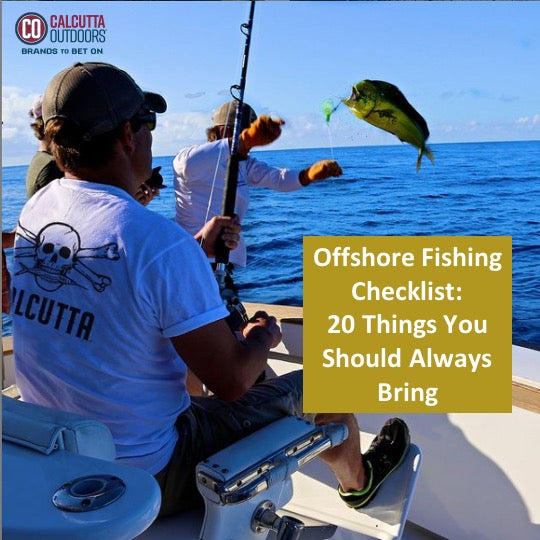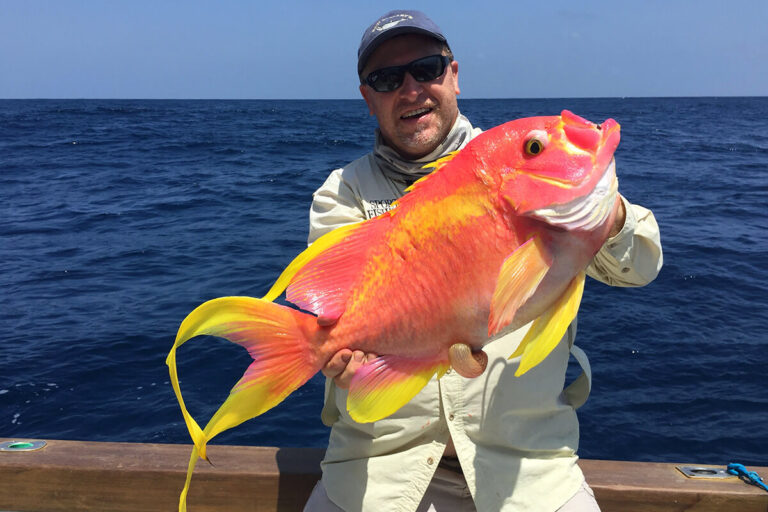To clean and store deep sea fishing equipment, rinse it thoroughly with freshwater after each use and dry it completely before storing it in a cool, dry place. Regularly inspect the gear for any signs of damage or wear and repair or replace as needed.
Additionally, use protective covers or cases for delicate equipment, such as fishing rods or reels, to prevent any damage during storage. By properly cleaning and storing your deep sea fishing equipment, you can prolong its lifespan and ensure it remains in optimal condition for future fishing trips.

Credit: www.amazon.com
Overview Of Deep Sea Fishing Gear Maintenance
Importance Of Properly Cleaning And Storing Deep Sea Fishing Gear
Taking care of your deep sea fishing gear is just as important as catching the big fish itself. Cleaning and storing your equipment properly not only extends its lifespan but also ensures that it performs at its best during your next fishing trip.
Here are the key points explaining the importance of cleaning and storing your deep sea fishing gear:
- Prevents corrosion: Saltwater is highly corrosive and can cause damage to your fishing gear if not properly cleaned. By rinsing your equipment thoroughly with fresh water after each use, you remove any salt and prevent corrosion from occurring.
- Enhances performance: Regular cleaning of your gear helps maintain its functionality. Removing dirt, sand, and other debris from your reels, rods, and lures ensures smooth operation and optimal performance on your next fishing adventure.
- Avoids fish odor transfer: Deep sea fishing gear can develop a distinct fishy odor over time if not cleaned properly. By washing your equipment thoroughly and air-drying it before storage, you prevent the transfer of unpleasant odors to your other fishing gear or storage spaces.
Benefits Of Extending The Longevity Of Your Equipment
Proper maintenance and care of your deep sea fishing gear offer several significant advantages and benefits. Here are the key points explaining the benefits of extending the longevity of your equipment:
- Cost-effective: Properly maintaining your fishing gear saves you money in the long run. By extending the lifespan of your equipment, you reduce the need for frequent repairs or replacements, allowing you to invest in other aspects of your fishing experience.
- Consistent performance: When your gear is well-maintained and in excellent condition, you can expect consistent and reliable performance. This ensures you have the best chance of landing that trophy fish and enjoying a successful fishing trip.
- Increased durability: Regular cleaning and storage practices reinforce the durability of your deep sea fishing gear. By protecting it from the elements and preventing unnecessary wear and tear, you can rely on your equipment to withstand the rigors of fishing in the open sea.
Key Factors Affecting The Lifespan Of Fishing Gear
Various factors can influence the lifespan of your deep sea fishing gear. Understanding these factors helps you make informed choices about cleaning and storage practices. Here are the key factors that can affect the longevity of your fishing gear:
- Exposure to saltwater: Saltwater is one of the primary culprits when it comes to gear deterioration. The high salt content and corrosive nature can lead to rust, damage, and reduced functionality of your equipment. Rinse and dry your gear thoroughly to combat the effects of saltwater exposure.
- Storage conditions: Where and how you store your fishing gear also plays a crucial role in its lifespan. Optimal storage involves keeping your gear in a dry and ventilated area, away from direct sunlight and extreme temperatures. Avoid storing your gear in damp or humid environments to prevent mold or mildew growth.
- Maintenance routine: Consistency is key when it comes to maintaining your fishing gear. Implementing a regular cleaning and storage routine helps prevent the buildup of dirt, grime, rust, and other issues that can impact the performance and longevity of your gear.
By understanding the importance of cleaning and storing your deep sea fishing gear, recognizing the benefits of extending its longevity, and considering the key factors affecting its lifespan, you can ensure that your equipment remains in top-notch condition for many successful fishing adventures to come.
Cleaning Deep Sea Fishing Gear
Deep sea fishing is an exhilarating adventure that requires specialized gear to tackle the challenges of the deep waters. But when the fishing trip is over, it’s crucial to properly clean and store your equipment to ensure its longevity and optimal performance the next time you embark on a fishing expedition.
In this section, we will explore how to clean deep sea fishing gear effectively, from rods and reels to lines and leaders, as well as hooks, lures, baits, and fishing nets and traps. Let’s dive in!
Tools And Materials Needed For Effective Cleaning
Before getting started with the cleaning process, gather the following tools and materials to ensure a thorough and efficient job:
- Freshwater: Use a hose or bucket of freshwater for rinsing off salt, sand, and other debris from your fishing equipment.
- Soft-bristle brush: A brush with soft bristles will help you gently remove dirt and grime from various surfaces without causing damage.
- Mild soap: Opt for a mild soap or detergent that is safe for use on fishing gear. Avoid harsh chemicals that could potentially corrode or degrade the materials.
- Microfiber cloth: A microfiber cloth is perfect for drying and buffing delicate parts, preventing scratches and keeping your gear in pristine condition.
- Lubricant: Prepare a suitable lubricant, such as reel oil, to protect moving parts and ensure smooth operation.
- Rust inhibitor: Consider using a rust inhibitor spray or gel to safeguard metal components from corrosion during storage.
Cleaning Techniques For Different Types Of Fishing Gear
Each type of deep sea fishing gear requires specific cleaning techniques to maintain its performance and longevity. Below are some cleaning guidelines for different gear components:
Cleaning Fishing Rods And Reels
- Rinse the rods and reels with freshwater to remove any salt, sand, or debris.
- Gently scrub the surfaces with a soft-bristle brush and mild soap, paying close attention to guides, handles, and reel seats.
- Rinse thoroughly to remove all soap residue.
- Dry the rods and reels with a microfiber cloth, ensuring there is no excess moisture.
- Apply a thin coat of lubricant to moving parts of the reel, such as the handle and bail, to prevent corrosion and ensure smooth operation.
Cleaning Fishing Lines And Leaders
- Loosely reel the line onto a clean cloth to expose all sections of the line.
- Wipe down the line with a damp cloth to remove any salt, sand, or dirt.
- Inspect the line for any signs of abrasion, fraying, or damage. Replace if necessary.
- After cleaning, allow the line to dry completely before storing it.
Cleaning Hooks, Lures, And Baits
- Thoroughly rinse hooks, lures, and baits with freshwater to remove any salt, sand, or debris.
- If necessary, use a soft-bristle brush to gently scrub the surfaces, ensuring all parts are clean.
- Dry the hooks, lures, and baits with a microfiber cloth to prevent rust and corrosion.
- Inspect for any damage, such as bent hooks or broken components. Replace if needed.
Cleaning Fishing Nets And Traps
- Rinse the nets and traps with freshwater to remove any salt, sand, or debris.
- Gently scrub the netting with a soft-bristle brush and mild soap to remove any stubborn dirt or odors.
- Rinse thoroughly to remove all soap residue.
- Hang the nets and traps to air dry completely before storing.
Now that you have learned how to clean and maintain your deep sea fishing gear properly, you can ensure its longevity and reliable performance for future fishing expeditions. Remember to always follow the manufacturer’s instructions and guidance for specific cleaning recommendations and techniques.
Proper Storage Practices For Deep Sea Fishing Gear
Suitable Storage Containers And Organization
Properly storing and organizing your deep-sea fishing gear is essential for its longevity and efficiency. Here are some key points to consider:
- Use waterproof and sturdy storage containers: Opt for containers made of durable materials such as plastic or metal that are resistant to water damage. Ensure they have secure lids to keep out moisture and pests.
- Separate and label different items: Group similar items together, such as lures, hooks, and lines. Labeling each container makes it easier to locate specific gear when needed.
- Utilize dividers and trays: To prevent tangling and keep smaller items organized, make use of dividers or trays within your storage containers. This helps maintain the integrity of your gear.
Avoiding Common Storage Mistakes
It’s important to steer clear of common mistakes that can lead to damage or deterioration of your deep-sea fishing equipment. Consider the following points:
- Don’t store wet gear: Before storing, thoroughly dry all equipment to prevent mold, mildew, and rust formation.
- Avoid overcrowding: Overstuffing containers or cramming gear into small spaces can cause damage, bending, or breakage.
- Keep gear away from direct sunlight: Prolonged exposure to sunlight can cause discoloration, fading, and weakening of materials.
Protecting Against Moisture And Humidity
Moisture and humidity can quickly become problematic for your deep-sea fishing gear. Take the following steps to protect your equipment:
- Consider using moisture-absorbing packets: Place silica gel packets or moisture absorbers within your storage containers to help prevent dampness.
- Opt for climate-controlled storage: If possible, store your gear in a controlled environment to reduce the risk of mold, mildew, and corrosion.
- Regularly inspect your gear: Routinely check for signs of moisture, such as condensation or dampness, and address any issues promptly.
Preventing Damage From Extreme Temperatures
Extreme temperatures can have adverse effects on your deep-sea fishing equipment. To prevent damage, keep the following in mind:
- Avoid storing gear in hot or cold vehicles: Extreme temperatures in vehicles can cause warping, cracking, or other damage to your gear.
- Choose a suitable storage location: Find a cool, dry area in your home or garage to store your equipment. Extreme temperature fluctuations should be minimized.
Rod Storage And Tangle Management
Properly storing your fishing rods not only protects them but also helps prevent tangles. Consider the following tips:
- Vertical storage: Store your fishing rods vertically, either by suspending them or using rod holders. This reduces the risk of bending or warping.
- Secure loose lines and hooks: Use hook keepers to secure loose lines and hooks to your rod. This prevents tangling and reduces the risk of damage.
- Consider rod socks or tubes: Keep your fishing rods protected and organized by using rod socks or tubes, which offer an extra layer of padding and prevent tangling.
By following suitable storage practices, organizing your deep-sea fishing gear, protecting against moisture and extreme temperatures, and properly storing your rods, you can ensure the longevity and efficiency of your equipment. Take the time to implement these practices, and you’ll be ready for your next memorable fishing expedition.
Long-Term Maintenance Tips For Deep Sea Fishing Gear
When it comes to deep sea fishing, proper care and maintenance of your equipment is essential for its longevity and optimal performance. By following these long-term maintenance tips, you can ensure that your deep sea fishing gear stays in excellent condition for years to come.
Regular Inspection And Repair:
- Inspect your fishing equipment regularly for any signs of wear and tear.
- Check the rods, reels, and other components for rust, loose or damaged parts, and frayed lines.
- Promptly repair or replace any damaged or faulty equipment to avoid further damage during your fishing trips.
Lubrication And Corrosion Prevention:
- Apply a thin layer of reel lubricant to all the moving parts of your fishing reels.
- Use a corrosion inhibitor spray to protect metal components from rust and corrosion.
- Clean and dry your equipment thoroughly after each fishing trip to remove any saltwater residue that could lead to corrosion.
Best Practices For Reel Servicing And Maintenance:
- Disassemble and clean your reels annually to remove dirt, debris, and salt crystals that can affect their performance.
- Inspect the drag system and replace any worn or damaged drag washers to maintain smooth and reliable drag settings.
- Apply a small amount of reel grease to the gears and bearings for smooth operation.
- Reassemble your reels carefully, following the manufacturer’s instructions, to ensure correct alignment and functioning.
Maintaining Fishing Line Strength And Integrity:
- Regularly check your fishing lines for any signs of damage or weakness.
- Replace damaged lines promptly to avoid breakages during fishing.
- Store your fishing lines properly, away from direct sunlight and extreme temperatures, to maintain their strength and integrity.
By incorporating these long-term maintenance tips into your deep sea fishing routine, you can enjoy many successful fishing trips with your reliable and well-maintained equipment. Remember, taking care of your gear not only extends its lifespan but also enhances your overall fishing experience.
Happy fishing!
Conclusion
To maintain the longevity of your deep-sea fishing equipment, regular cleaning and proper storage are essential. By following the steps outlined in this guide, you can ensure that your gear remains in top condition for future fishing adventures. Remember to rinse your equipment thoroughly with freshwater after each use to remove salt and debris.
Allow everything to air dry completely before storing to prevent the growth of mold or mildew. Organize and store your equipment in a clean, dry, and secure space, such as a tackle box or gear bag, to protect it from damage.
Taking these simple but important steps will not only extend the lifespan of your deep-sea fishing gear but also maintain its performance, making your next fishing trip an enjoyable and successful one. Happy fishing!





